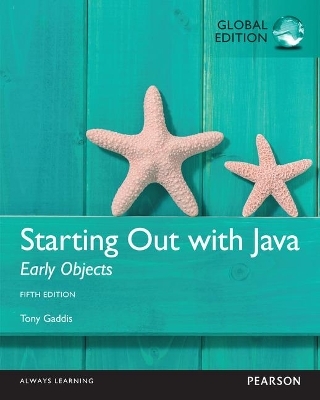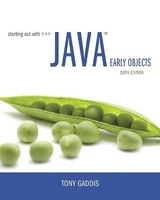
Starting Out with Java: Early Objects, Global Edition
Pearson Education Limited
978-1-292-07604-1 (ISBN)
- Titel erscheint in neuer Auflage
- Artikel merken
* Enhance Learning with the Gaddis Approach: Gaddis's accessible approach features clear and easy-to-read code listings, concise real-world examples, and exercises in every chapter. * Keep Your Course Current: Content is refreshed to provide the most up-to-date information on new technologies for your course. * Support Instructors and Students: Student and instructor resources are available to expand on the topics presented in the text.
Chapter 1 Introduction to Computers and Java
1.1 Introduction
1.2 Why Program?
1.3 Computer Systems: Hardware and Software
1.4 Programming Languages
1.5 What Is a Program Made of?
1.6 The Programming Process
1.7 Object-Oriented Programming
Review Questions and Exercises
Programming Challenge
Chapter 2 Java Fundamentals
2.1 The Parts of a Java Program
2.2 The System.out.print and System.out.println Methods, and the Java API
2.3 Variables and Literals
2.4 Primitive Data Types
2.5 Arithmetic Operators
2.6 Combined Assignment Operators
2.7 Conversion between Primitive Data Types
2.8 Creating Named Constants with final
2.9 The String Class
2.10 Scope
2.11 Comments
2.12 Programming Style
2.13 Reading Keyboard Input
2.14 Dialog Boxes
2.15 The System.out.printf Method
2.16 Common Errors to Avoid
Review Questions and Exercises
Programming Challenges
Chapter 3 A First Look at Classes and Objects
3.1 Classes
3.2 More about Passing Arguments
3.3 Instance Fields and Methods
3.4 Constructors
3.5 A BankAccount Class
3.6 Classes, Variables, and Scope
3.7 Packages and import Statements
3.8 Focus on Object-Oriented Design: Finding the Classes and Their Responsibilities
3.9 Common Errors to Avoid
Review Questions and Exercises
Programming Challenges
Chapter 4 Decision Structures
4.1 The if Statement
4.2 The if-else Statement
4.3 The Payroll Class
4.4 Nested if Statements
4.5 The if-else-if Statement
4.6 Logical Operators
4.7 Comparing String Objects
4.8 More about Variable Declaration and Scope
4.9 The Conditional Operator (Optional)
4.10 The switch Statement
4.11 Formatting Numbers with the DecimalFormat Class
4.12 Focus on Problem Solving: The SalesCommission Class
4.13 Generating Random Numbers with the Random Class
4.14 Common Errors to Avoid
Review Questions and Exercises
Programming Challenges
Chapter 5 Loops and Files
5.1 The Increment and Decrement Operators
5.2 The while Loop
5.3 Using the while Loop for Input Validation
5.4 The do-while Loop
5.5 The for Loop
5.6 Running Totals and Sentinel Values
5.7 Nested Loops
5.8 The break and continue Statements
5.9 Deciding Which Loop to Use
5.10 Introduction to File Input and Output
5.11 Common Errors to Avoid
Review Questions and Exercises
Programming Challenges
Chapter 6 A Second Look at Classes and Objects
6.1 Static Class Members
6.2 Overloaded Methods
6.3 Overloaded Constructors
6.4 Passing Objects as Arguments to Methods
6.5 Returning Objects from Methods
6.6 The toString Method
6.7 Writing an equals Method
6.8 Methods That Copy Objects
6.9 Aggregation
6.10 The this Reference Variable
6.11 Inner Classes
6.12 Enumerated Types
6.13 Garbage Collection
6.14 Focus on Object-Oriented Design: Class Collaboration
6.15 Common Errors to Avoid
Review Questions and Exercises
Programming Challenges
Chapter 7 Arrays and the ArrayList Class
7.1 Introduction to Arrays
7.2 Processing Array Contents
7.3 Passing Arrays as Arguments to Methods
7.4 Some Useful Array Algorithms and Operations
7.5 Returning Arrays from Methods
7.6 String Arrays
7.7 Arrays of Objects
7.8 The Sequential Search Algorithm
7.9 The Selection Sort and the Binary Sea
| Verlagsort | Harlow |
|---|---|
| Sprache | englisch |
| Maße | 204 x 252 mm |
| Gewicht | 1854 g |
| Themenwelt | Schulbuch / Wörterbuch |
| Informatik ► Software Entwicklung ► Objektorientierung | |
| ISBN-10 | 1-292-07604-6 / 1292076046 |
| ISBN-13 | 978-1-292-07604-1 / 9781292076041 |
| Zustand | Neuware |
| Informationen gemäß Produktsicherheitsverordnung (GPSR) | |
| Haben Sie eine Frage zum Produkt? |
